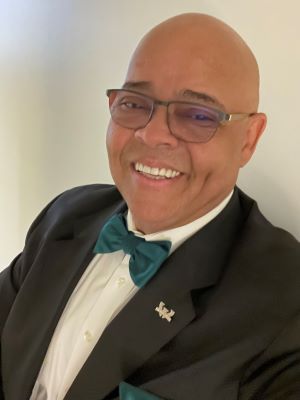
Charles M. Washington
RADIATION THERAPY TECHNOLOGY
Graduated in 1987
Senior Director, Radiation Oncology
Memorial Sloan-Kettering Cancer Center, New York, NY
Q: Why did you choose Wayne State University?
A: Wayne State offers excellent educational platforms and is respected across both the United States and the rest of the world. It also afforded me the opportunity to be close to home while pursuing my education.
Q: What inspired you to pursue Radiation Therapy Technology?
A: I was inspired by my desire to engage/help people and leverage my aptitude in math and science, both critical in Radiation Therapy Technology. During my pre-med matriculation at WSU, my father needed radiation treatment as part of his lung cancer management; during that time, I learned about the profession and wanted to pursue that field for the above-mentioned interests. How fortunate was I that Wayne State offered a premier program in the profession...I entered the program, received what I thought was the best preparation for practice that could be offered, and built on that platform to achieve my initial goal of helping others.
Q: Who was your most memorable Professor?
A: I must cite two professors during my professional education, as I attribute both to my professional success. Diane Chadwell and Adam Kempa were among the best educators that I have experienced. Both challenged me to be my best and made me dig into material to go beyond a superficial understanding. They established an environment that stimulated my motivation to be the best that I could be. They took the time to encourage me to appreciate the profession and to give back to it. I have reflected on those experiences throughout my professional career. Diane sponsored me to our professional organization; Adam challenged me to continue to elevate my educational potential. I attribute them to my professional success. To that end, I dedicated my doctoral dissertation to them.
Q: What was your most challenging class?
A: The Anatomy and Physiology courses were challenging. The intricacy of the practical application demanded consistent work. While it was the most challenging for me (even more than radiation physics), it was foundational in understanding how my discipline engages with the human body.
Q: Where was your favorite place to study?
A: My favorite place to study was the Wayne State library. Prior to the internet, the library offered an environment to study, research, and reflect.
Q: Did you have a favorite hangout on campus?
A: I liked to go to the Student Center. During school, I worked there as a building manager, so I knew it well. It was a great place to meet friends. I also liked the Recreation Center where I could play pinball and ping pong during down time.
Q: Share some reflections about your time at Wayne State:
A: I credit my professional success to the education and experiences at Wayne State University. I learned not only about the intricacies of my profession, but I also learned a lot about myself. The University provided me with tangible skills to help others through a specific discipline and how to use those skills to provide care and comfort to patients. Further, Wayne State groomed me to be the leader that I am today.
Q: In your opinion, what is one of the biggest changes that has occurred in your profession since graduating?
A: Since my graduation, radiation therapy has incorporated various advanced imaging modalities into the planning and treatment management of cancer patients. Today, the radiation therapist must be versed in not only understanding and utilizing x-ray images and CTs, but also magnetic resonance imaging as part of daily practice. Continuing education and competence assessment are critical for the practitioner to remain relevant.
Q: Share a career highlight or summary:
A: I have been blessed to have had leadership opportunities in my professional career. There are three that stand out for me: being elevated to Fellow status in the American Society of Radiologic Technologists (the highest honor bestowed on a practitioner), being recognized as a Trailblazer in Medicine in the New York community by the Omega Psi Phi Fraternity, and being named as a member of the Eugene Applebaum College of Pharmacy and Health Sciences Board of Visitors.
Radiation therapists have a unique opportunity to blend the knowledge and skills of mathematics, science and psychology in their daily work. Radiation therapists operate sophisticated radiation equipment to treat malignant tissue, assist in designing cancer treatment through the use of 3D computer-generated calculations, recognize when a patient is having additional medical problems that require a doctor’s attention and provide psychological support for patients who are dealing with the stress of their illness. The bachelor of science in Radiation Therapy Technology is offered through Wayne State’s Eugene Applebaum College of Pharmacy and Health Sciences with an application deadline of Nov. 30.
An anchor in urban health care
The Eugene Applebaum College of Pharmacy and Health Sciences is built on more than 100 years of tradition and innovation in the heart of Detroit. We have grown deep roots in our city, harnessing its powerhouse hospital systems and community service organizations as vibrant, real-world training grounds for students, with an ongoing focus on social justice in health care. And our research at all levels – from undergraduates to veteran faculty members – translates into creative solutions for healthier communities.
Wayne State University is a premier urban research institution offering approximately 350 academic programs through 13 schools and colleges to nearly 24,000 students.